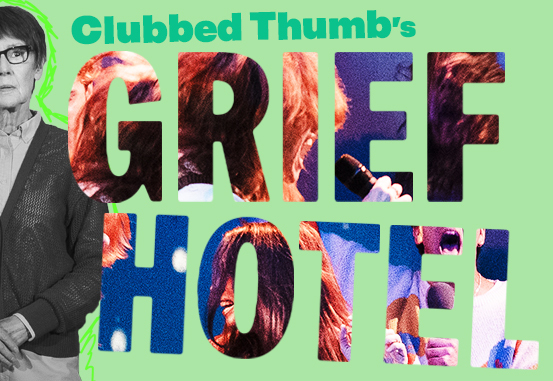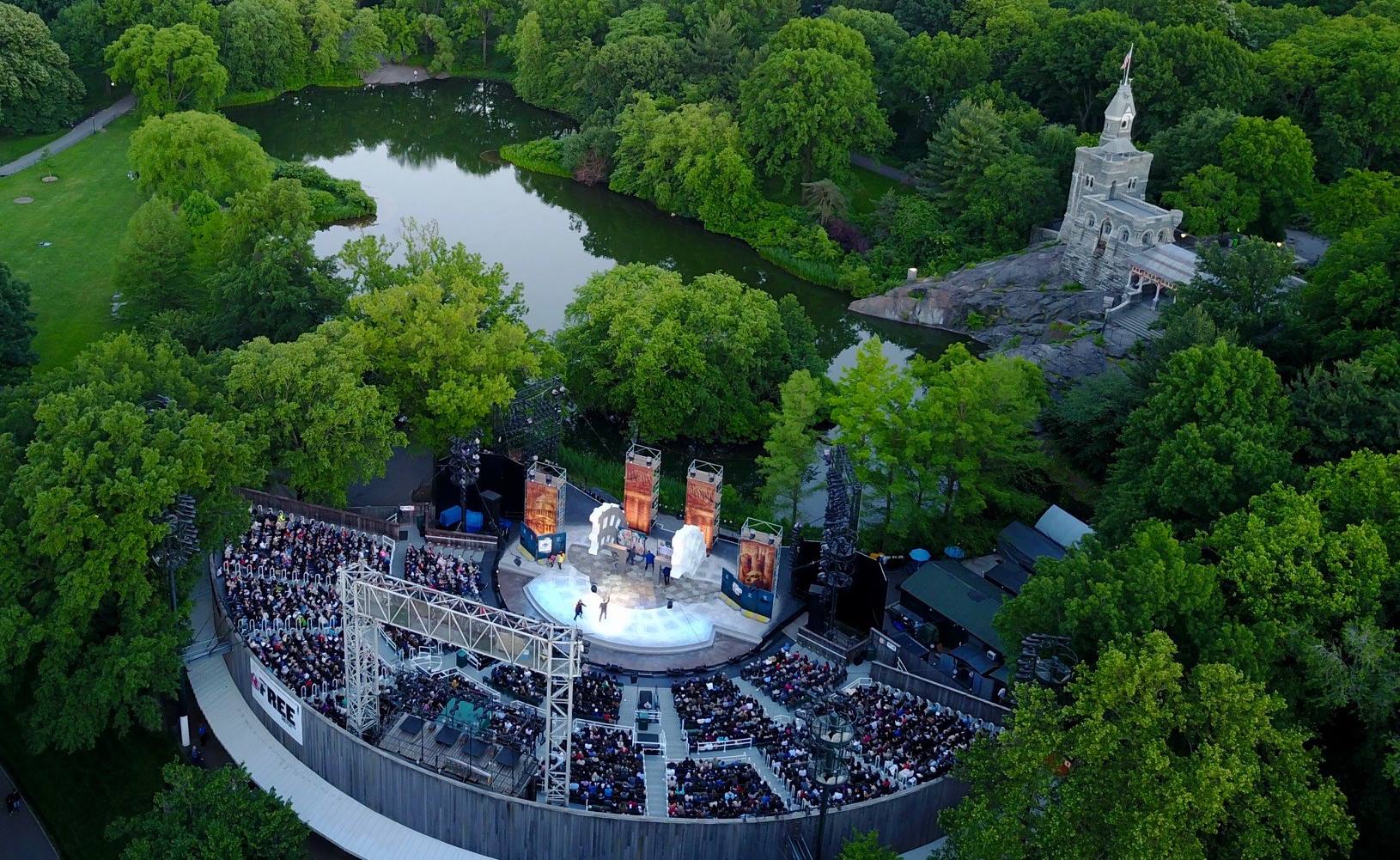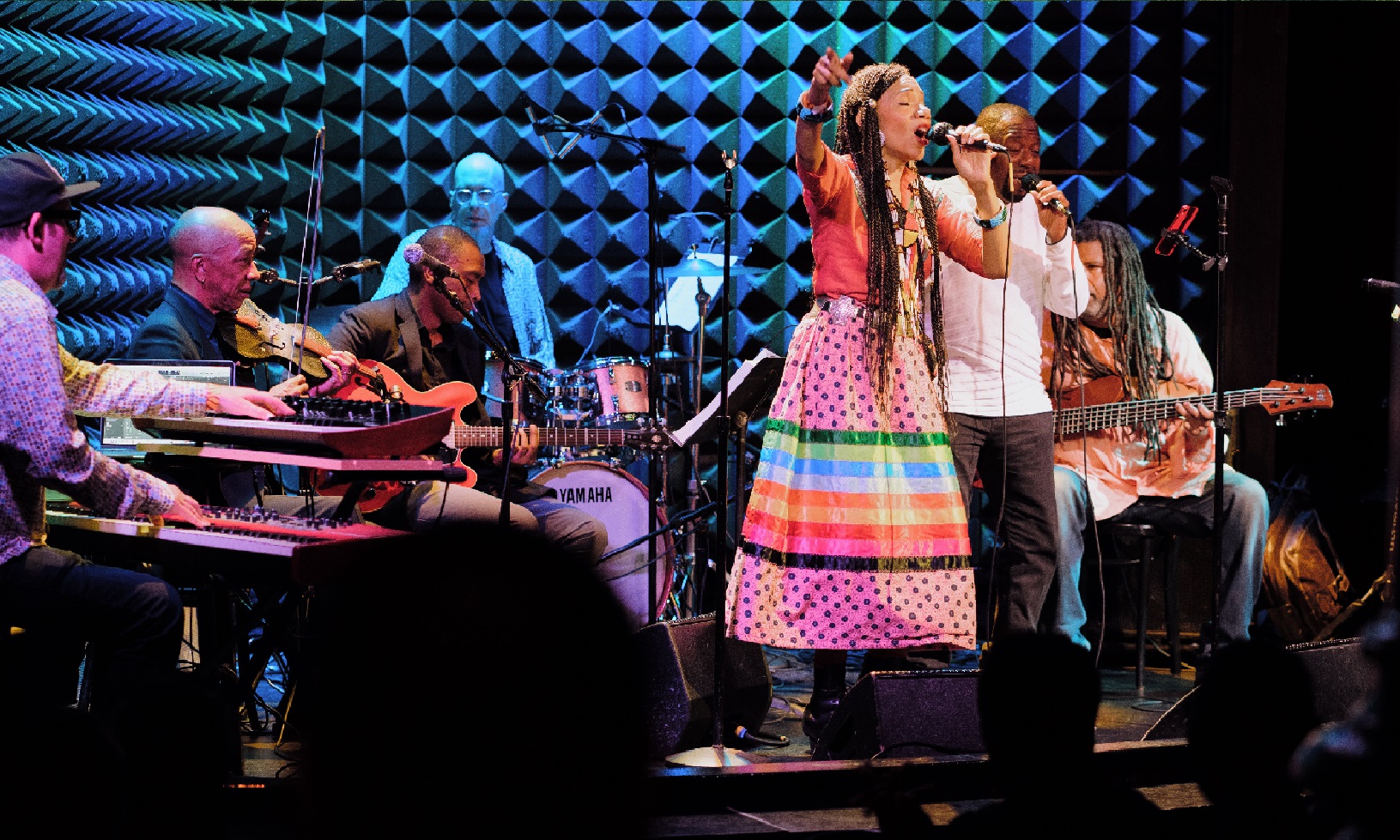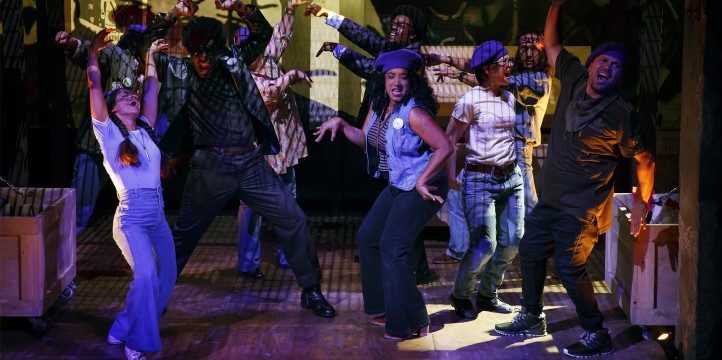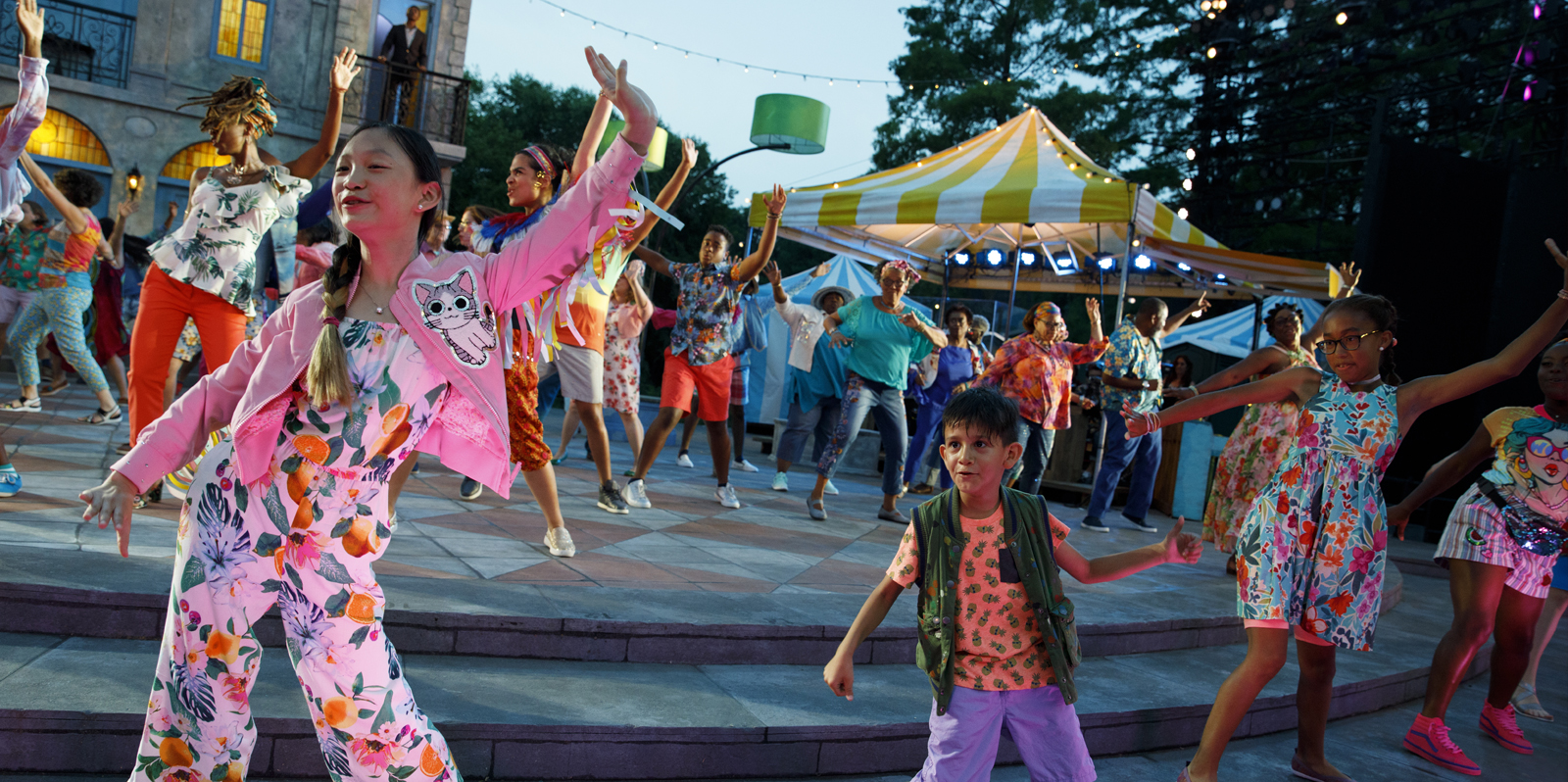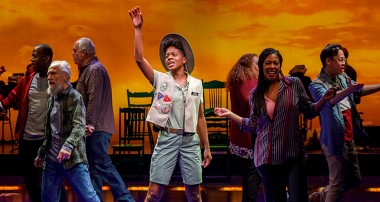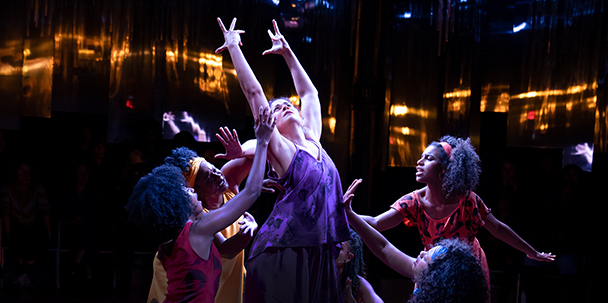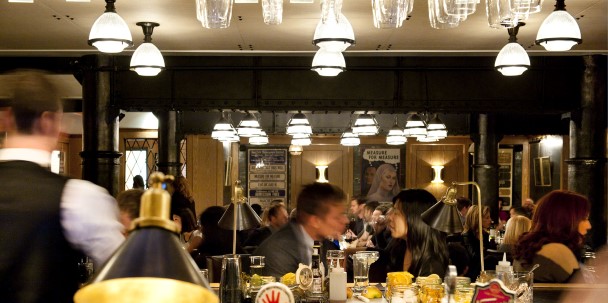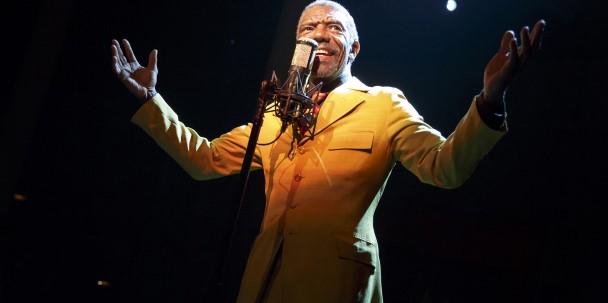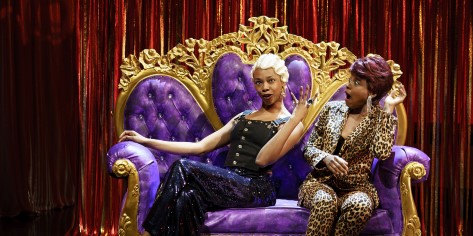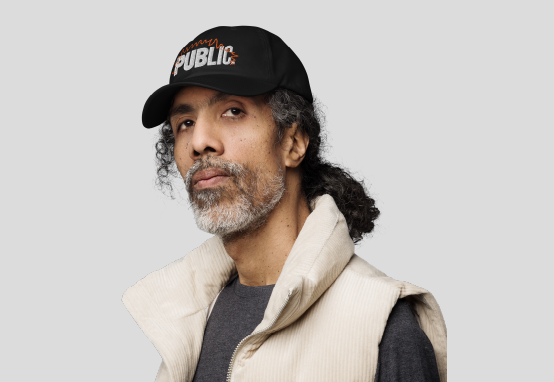Julián Mesri (JM): Thank you so much for taking the time to do this.
José Rivera (JR): It’s my pleasure. I'm really flattered that you asked me. I read the play yesterday. I really, really love your play.
JM: Thank you so much.
JR: It is so good. And you know, I approach every new play I read with great skepticism. But after a few pages I thought, “I’m really into this.” And it takes some turns towards the end that are really shocking and wonderful. It’s really good. You should be very happy with it.
JM: Thank you so much. You’ve always been such an inspiration to me, especially among writers that utilize different styles. I have a lot of skepticism too, and part of it is in response to what can feel like the sameness of a lot of things. I’m always interested in finding new voices and new ways of thinking. And when I read your work, it’s very much that for me. You’re someone who’s thinking of different modes of expression and storytelling within the theatrical medium. Some stories aren’t able to be told by your classic, well-made play structure. Sometimes we need to find new ways of exploring. Using the words “magical realism” can be so reductive—sometimes we put ourselves in a little corner by saying that—but just that departure from realism. I don’t want to call it magical.
JR: I have a friend, a playwright in San Diego, a professor, and he calls my style “mad realism.”
JM: I love that. I love that. And I feel like there's so many ways of thinking of it. You know, in Argentine theater, we have a whole genre called grotesco criollo. And it’s not realism. A lot of them are just dysfunctional family dramas, but they’re done in such a non-structured way, because, you know, dysfunction is never that structured. Or at least, it’s structured in different ways. I like to call it “organic absurdity”; it's coming from our world, it’s coming from the earth, but it’s completely and utterly irrational if you just take a look at it for a second. And then it takes a while, because nature has that sort of absurdity to it as well.
JR: I totally agree. What I like about your play is that it has its feet firmly in our world. In the beginning, we see a living room, a swimming pool, a marriage. And then you suddenly, with great care, introduce an element that is completely theatrical. It could be magical. It could be ghostly. It could be so many things. And you won’t define it for us, which I love. You just let the drama unfold, and we go with it, and it takes us somewhere.
JM: That was definitely a struggle. Because when I started writing it, I didn’t know what it was either. I had this idea of the Fray, and he would appear, and was haunting the swimming pool. And then I learned who the Fray was and what their role was as I was writing it. For me, that’s the beauty of a rewriting process, and the theatrical process in general. My characters are sort of teaching me who they are as I’m writing them. And then as I’m rewriting, I’m going back to them, and I’m realizing, “Oh, no, they’re pushing in this direction. I hadn’t even realized that!” Getting to that point with the Fray, and then getting to that point with Pamela… I think I had to figure out Pamela in order to figure out the Fray. I didn't realize how connected their stories were until basically the last draft.
JR: And they’re really well connected, too. He wouldn’t exist without her, and she would be incomplete without him. There’s a great symbiosis.
It’s funny, you have a sentiment in your play that’s almost identical to something I wrote several years ago in my play Another Word for Beauty, about a beauty pageant in a women’s prison. It’s set in Columbia. It’s based on a true story. Each contestant is asked the same question: “If you could go into a time machine and go back to any period in time, where would you go and why?” And one of the women says, “I would go to 1492 with a rocket launcher, and I would blow those fucking ships out of the water.”
JM: And was that a real response, or something you wrote?
JR: No, I wrote that response.
JM: I love that.
JR: It would have been cool if it was real. But if anyone were to ask me that, I would say I’m going back to 1492. So there’s very similar language in your play, very similar sentiments.
JM: Yeah, Pam says something very similar at the end. That’s one thing that I always wrestle with, in terms of Latin America… It’s like, yes, that’s all true. But then also, it’s literally in our blood. This colonial destruction, this legacy of violence, is in us in some way. How do we process these legacies that we have had no control over? What do we do with that? How do we create a family with that? And how do we create a politics with that?
JR: I think, the Friar is able to articulate a narrative that isn’t as well known in the West: his passionate objection to Spanish brutality and the dehumanization of indigenous people. I was so glad that you articulated that, because that is a side of the story that we don’t normally include in these narratives. Spanish cruelty was legendary, horrifying, and it is something we still carry with us today. And it was nice to know that, for a moment, someone of some significance said No.
JM: I remember we read Bartolomé in an undergraduate political theory class, and my teacher explained that this was the first time that we had some kind of investigative exposé talking about major atrocities committed by Europe. This was the first time that we really got a historical consciousness of, “Maybe colonial violence is not good.” But reading Bartolomé is so frustrating, because he was so right about that, but then he’s like, “Oh, but then we should just import enslaved persons from Africa instead.” I’m like, “No! You were so close!”
JR: I know, so close. But he, like other Europeans, believed, “Some people have souls. Some people don't have souls.”
JM: I read that towards the end of his life, he realized how fucked up a position that was. But at that point he’s like, “Oh, well, God dammit.” But I think it’s so important that Bartolomé had that conscience, and that he brought that into the narrative. The reason that we know how fucked up Columbus was, it’s really because of him. There’s no other documentation of how messed up that time was.
JR: Columbus’s own journals said something like, “The ‘island people’ are so tall and strong and good looking, they’ll make wonderful servants.”
JM: Just, the level of atrocity and unhinged violence in the name of greed. And Columbus only begins the legacy, right? It’s not as if you have this madman doing these horrifying things, and then it stops. And that’s why in the play, Bartolomé has this monologue where he keeps opening his eyes at different moments of atrocity during Latin American history. That’s sort of the truth. And, you know, who colonizes us? Is it the Spanish? Is it the English landowners? Is it the United States? It just keeps switching.
JR: It’s layers of colonization, layers. And we’re suffocating under all of them.
JM: I’m not a pessimist, really. I mean, I think it’s a comedy.
JR: I was laughing.
JM: Oh, good. Yeah, I mean, I feel like you can go through the sort of pathos route, and really just lay in your sadness. And that’s important, too. Or you can use humor, and open more. I feel that humor has this really wonderful way of making things accessible, and inviting people rather than punishing them.
JR: You know, I laughed a lot, especially about the conflicts over American culture, and the critique that the brother brings to, you know, all the shit that constitutes his idea of America. Even in the conversations about soccer, when he says, “You cannot praise the other team, you cannot say—
JM: Those are verbatim words. I love that. Those are conversations my father used to have with certain friends, or even with my mother, sometimes. I remember I was watching Argentina play Brazil during the final Copa América—not the most recent one, the one where we lost three-one. And every now and then, someone would go, “Oh, that was really good.” And I was like, “No, don’t say that! When they’re attacking you’re just quiet!” You know, a lot of that is drawn straight from my life, and from this weird obsession that Argentinians have with soccer. There’s a kind of gatekeeping that occurs that’s very much bound up in machismo and a certain kind of fervent nationalism. I think what’s interesting about—at least my generation of Argentina—is that we are a very non-nationalistic place in a lot of ways, partly because of the dictatorship. Nobody flies Argentine flags, or sings the national anthem. Intense nationalism is still seen as fascist. But the second the national team plays, everyone is all about the country. Suddenly there’s so much national pride. Even people who are heavily of the left who continue to critique the government will still cheer like hell for a team and will cry like crazy, especially when you’re in the diaspora.
JR: Sports are controlled warfare.
JM: Exactly, yes.
JR: Peaceful war with rules, and you can get fucking crazy about it, and it’s okay.
JM: I feel that we would have had—I mean, we still have a lot—but we would have a lot more national conflicts. Because that used to be a role of war, just, nations needing to establish who they are to other nations. That’s what Hegel says. Ridiculous. But that’s what soccer is. “This is me, these are my soldiers that I’ve built up.” I was talking to an Uber driver, we were talking about the World Cup, and he was like, “Yeah, I’m from this town in Bangladesh, and we’re all obsessed with Messi.” Like, Bangladesh became super, super on the side of Argentina—Argentine flags everywhere, for a team that is playing in a completely different country. It’s super interesting, national identities. This is something I think a lot with Bartolomé, too—different layers within immigrant identities. It’s not as simple as, you either aren’t from here, or you are from here. There are so many different ways to become an immigrant, to naturalize, to assimilate, how much you assimilate, all of that.
JR: In your play there’s a great critique of Pami’s assimilation, and her husband’s, by the brother. His criticism of their assimilation is really powerful. One thing I was really struck by—because your play begins in a kind of innocence—swimming pool, people, painting —and then the radius of the play just grows and grows, in terms of the dramatic stakes. So by the time we learn that the brother was actually a torturer, we have really gone a long way from the kind of innocent domesticity of the beginning, and now we’re dealing with hardcore, heavy historical shit, that we still haven’t moved beyond, really. It was so gratifying to see you dealing with that in your play, because it’s important. Irene Fornés dealt with it in The Conduct of Life.
JM: I was just thinking about that. That was a huge inspiration for this play.
JR: I can see that. It’s an inspiring play, period. But you grapple with it in a really direct and very painful way. The brother talks about a time he used a cattle prod on a man’s genitals until they turned black. It’s some heavy, unresolved history, our history, their history, you know?
JM: One of the things that struck me so much about the Fornés play, and I think my favorite parts of Conduct of Life, were those moments of domesticity. The proximity of the banal to horror. Here it’s trickier, because a lot of the United States’ horror is exported. Not all of it. It’s here in the police system. But I’m thinking in terms of support of other country’s dictatorships, or its use of torture. In Buenos Aires you’re walking down the street and you see a sign that says, this used to be a torture center. The proximity of that level of depravity is really strong. It’s just in the fabric of a city that includes all those other things that you really love about it, that you’ve grown up with.
To give you a personal example—and I was way too young to understand this, I think I was like eleven—my family is very large, and we were at an asado, and I have these older cousins and I think they’re really cool, and then suddenly it got really quiet. I think it was Christmas or New Years, and one cousin had brought a girlfriend, and everyone was suddenly really quiet and talking about it. What is going on? And that girlfriend my cousin had brought was the granddaughter of Massera. Who was one of the, you know—there was Videla, Massera, and Agosti, and Massera was the one in charge of ESMA, the guy who ran the Navy, who ran the torture site that is now the museum. And it was his granddaughter just right there. That side of my family is strictly middle class, just a house in Olivos, and Massera’s granddaughter is right there. I was eleven and I could not understand that. Now I think about that and I’m like, that’s insane. And again, it’s in the city itself, it’s within the fabric of the country, they’re your neighbors, it’s not like there’s some otherness that’s far away.
It’s also ingrained in the—we won our first World Cup in 1978, and people who were testifying for human rights abuses remember hearing the cheering of the crowds in El Estadio Monumental from their torture cells. So that’s something I really wanted to bring to bear for this piece. Because, at least in my experience in this country, I think we have a way of categorizing things—“Oh, yeah, that’s really terrible”—but there’s no way to really humanize it and to think about the human scale of what has happened. It’s always sort of a larger, more abstract method.
JR: The other thing you touched on in the play was the painful reality depicted in the film The Official Story—in which children are taken from families who have been killed or tortured, and given to childless couples in the military, or middle-class families. That surprised me in your play, in a good way. Because I thought, of course. When the brother said something about once smelling his infant sister’s piss, I thought, yeah, that means something, I don't know what it is yet. And then you pay it off later, and holy crap, that was a good move.
JM: Yeah, the Piss McGuffin, let’s say. When I was writing it, I thought, the twist is just so obvious. It’s going to be very clear that I say these dates, and I mention these things, everyone will know, “Oh, this dude also tortured people.” But it was very interesting when I was sharing this in pieces in EWG, because people were super on Lautaro’s side. And I was like, What? For me, I have such a vision of what that person is, and I’ve grown up around that kind of mentality. And that braggadocio kind of Argentine asshole, macho mentality, it’s not exclusive to the right-wing torturers. It’s pervasive. My uncle, everyone, you know, we’re all kind of—hopefully I’ve been raised a little bit differently here. But I was really surprised when people didn’t put things together. I laid out a bunch of clues, but maybe only someone from Argentina or someone who really knows about this will really get those clues. Which is cool, because then then the reveals at the end are a little bit more shocking, and change your mind about how you feel about this character.
JR: I agree. In your play we’re always walking through landmines—you don’t know where they are and when they're going to explode. And so by the time we get to the end, we land on several landmines that explode on us, but in a way that feels inevitable without being predictable. Did the process surprise you as you were going along? Did you get surprised by the turns that you created?
JM: I think I did. I mean, I knew what the reveal was—not immediately. I started this play in Lynn Nottage’s American Spectacle class at Columbia. The assignment was to watch a pro wrestling match. It wasn’t WCW or WWE or anything like that, it was second or third-tier. It was so much fun. And thinking about violence; how do I think about violence? I came up with Bartolomé de las Casas Ruins My Pool just as a title, and I’d written it up as this domestic couple and their conversation was just filled with violent imagery. That idea stuck with me for a long time.
I came back to thinking about just that image, the idea of a swimming pool. I was in Miami for five months during the pandemic staying with my dad and his family. I didn’t have my own room, I was in the living room surrounded by privacy screens, and, you know, you’re living with people up close. Miami is a really interesting place because it’s a diaspora. It’s like a Latin American city, but also the kinds of people that choose to live in this Latin American city that are not from the US, a lot of them really buy into this idea of America that you don’t necessarily experience in Latin America anywhere, right? It’s a very specific group of people who self-selected themselves to have that kind of experience here, whether by choice or because their situation at home is really, really terrible. But you still have to choose America as the place that will provide that kind of salvation. It creates a really weird dynamic.
JR: I’ve only been to Miami a couple of times for research purposes for a film. It did strike me as a very Latin city. More than any city I’ve seen in the United States, Miami wears its capitalism so nakedly. Such ostentatious wealth, and unrestrained machismo about wealth. I was blown away. I thought I’d seen it all in LA. And Miami made LA look like a little cow town.
JM: I’ve never been to LA but you hit the nail on the head. It’s like capitalism on full display. And the Latin American that buys into the myth of Miami—it’s in some ways because of capitalism, right? It’s America and capitalism. I’ve got to show you my wealth. I've got to show you my cars. I've got to get the house with a swimming pool.
JR: I’ve gotta show you my body, my beautiful, expensive bikini body.
JM: Oh, my god. Yes. Exactly. Completely. It induces a lot of anxiety in me whenever I’m there. This is the first play I’ve written where really a lot of it is just elements of my very complicated relationship with Argentina on full display. In general, I talk about Latin America, I talk about politics, but this was the one where I went personal. Even though none of the characters are based on anyone, thank god. But even that Ingres painting, there is an actual Ingres painting that I based that on. There was a whole saga in my dad’s family, my grandfather had this Ingres, they called it “The Ong.” And when my grandfather passed away, my father was trying to get it appraised. Eventually it turned out to be just a really good reproduction. It’s still on display in my dad’s cousin’s house. I visited in March and I was like, “My god, it’s still there. There it is.”
JR: That was a really interesting misdirection in the play, because that’s how you begin the play. And I thought, oh, it’s gonna be a play about middle class people with their uptown problems. Is the painting worth 100,000 or 400,000 or nothing? So I was set up to follow that story, and then you hit me with all the other shit. The assimilation, the relationship between Argentina and the United States, the kind of interior psychic battle going on within the same person as to what world they belong to, what culture is feeding them or not feeding them. There’s a great line about blood in the soil. These are people who don’t know their blood, really, or their blood is fighting itself, because there are so many external forces pushing them into choices. And being in Miami is a choice. So we grow from this kind of mundane, middle class obsession with a painting into a kind of, holy crap—it’s a great journey, you know?
JM: Thank you. I love how you outline that, because it’s very much how I think of it in my head. And also, you know, the affinity—and this is something which is very much a part of Argentine culture which has almost become a cliche now—but this affinity to Europe, how Argentina wants to be Europe, or idolizes Europe. It’s a lot less now, and I think that the 20th century has really fought it out. But our Civil War essentially was about that. And it just creates this idea that we’re basically like Europe, or Europeans. And it’s like, “No, also Europeans colonized you!” I love how you said we don’t know where we’re from. You know, I do an ancestry.com, and I’m from so many different places, so many different immigration groups, including indigenous groups in Latin America, and I don’t know how that story happened, and it’s probably not a great story. And if the Americas have these histories that are built on conquest and destruction and violation, what is it that we base ourselves on? What is it that we ground ourselves in? And there’s Bartolomé, who was ungrounded, and yet haunts all of history, because we haven’t addressed it yet. How does one address it, I guess is the question.
JR: One interesting psychological question is, with such legacies of violence within our bodies, and our DNA and emotional and cultural memories, where and how do you and I, as Latin Americans, find peace?
JM: Where do you find peace?
JR: I find peace in creativity, I find peace in the act of organizing violence into words that I can control. And to me that is healing. It doesn’t last forever, or even very long. But what do you do if you’re not a writer? Like my father was a janitor, he never found peace.
JM: My dad was a scientist. I feel like he found peace in culture and music. I think that he began very much by finding peace in nostalgia for Argentina. I think that’s where it comes from. I get a version of Argentina that is mediated from my parents, and I was 20 or 30 before I worked out my own relationship to it. I took this really great class in college called Latin American Civilizations, and our professor said, in this very generalizing way, that one thing defines each civilization. That in Europe, it’s culture; in America, it’s money; and in Latin America, it’s politics. It was very general. But I think in some ways… you know, we think about politics as how people can come together and create order within chaos. I think that’s very much the case. And I think about what you just said and it reminds me of the history of our own theater. I remember you did a really beautiful adaptation of Fuenteovejuna [Massacre (Sing to Your Children)], and I directed Fuenteovejuna at Repertorio Español. You take that tradition of resistance—and violence, but also resistance within violence—and you can make that your own. You no longer have to make it about the King and Queen of Spain, who were terrible and who started the whole colonization of the Americas in the first place. We have to address the violence, we have to address the tragedy. But there’s a way of making humor and beauty and complicated theater about it. And that’s why I feel lucky to be able to do what I do as a writer, as a creator.
JR: You sound like you grew up with a lot of culture in your life. I didn’t. In my home, culture consisted of language, food, music. We didn’t have books, we didn’t have art. My parents were not formally educated. But the thing they loved was music. They had scores of records, LPs from the island. So here I am, I’m a young kid growing up on Long Island in the 60s, and what do I want to listen to? I don’t want to listen to jibaro music, I want to listen to the Rolling Stones. You know, as a kid, my form of rebellion was in the form of really loving rock and roll, and British Invasion, and all that stuff my parents hated. And then, once I was in my 20s and 30s, I rediscovered my parents’ music, and I absolutely fell in love with it. I would get teary-eyed listening to their old records, even though, my god, I did everything I could to reject it when I was a kid. A few years ago, I went back to Puerto Rico with my daughter. And we went to the little town where my mother grew up called Miraflores, and we were with cousins and second cousins and grand cousins. And suddenly, we were on the porch, I looked around, and everyone had a guitar. The old folks start playing, the kids started singing. And you know, I grew up in a religious household, so I rebelled against religion, but all their songs were church songs. And beautiful, the harmonies were so gorgeous. I thought, oh my god—God is in the music here. It’s not just music, it is like a sacred expression of faith. I just felt connected there in a way I hadn’t before. And I can see my daughter next to me, tears coming down her face.
JM: That’s so special.
JR: Yeah, it was really quite a beautiful, beautiful day.
JM: The last New Years I was able to spend with my dad, part of it was just us around the fire, singing songs. And you know, he played very bad guitar, and then I would help him out, or he would grab a bombo de guerra and start drumming. I have step-brothers whose mom is Argentine and their dad is American, and only recently have they really started embracing that part of themselves. And I remember I was basically their age when I discovered that oh, my god, there’s all this music that is really great, and it belongs to my culture. Folk music in these traditions, it’s such a generational thing, too, a legacy that we get to pass on. There are really problematic, horrifying legacies, which is kind of what Bartolomé is about. But I think there’s this other side, a legacy of resistance. So many of the songs are protest songs, and come from resistance movements all around Latin America, whether it be Chile or Argentina, México or Brazil. Having that be a part of our legacy as well is really powerful.
*

